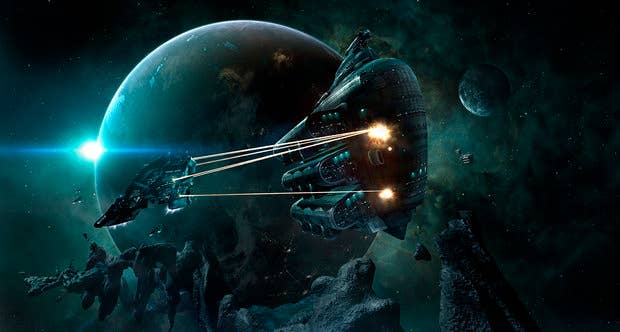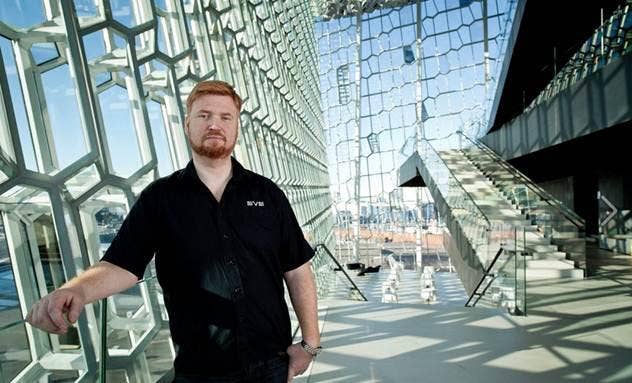CCP CEO: "A big company can become very dumb, very quickly"
Hilmar Petursson on taking CCP worldwide, expanding EVE and chasing new platforms.
For years, CCP had been known as the EVE Online company. However the developer has recently expanded from its one-product focus with the release of Dust 514 for PlayStation 3 and the ongoing development of the World of Darkness MMO. Not only is the company pushing to expand its product lines, but it's also seeking new audiences for its tentpole EVE brand. The studio has already stepped into the free-to-play market and mobile development is the next step. GamesIndustry International sat down with CCP Games chief executive officer Hilmar Petursson to talk about holding onto EVE Online's passionate fans and growing into a multi-national development house.
"It took us awhile to get to the point of being a multi-product company. Obviously, it happened for real with Dust 514 as we released it last month. Prior to that, we had a decade of EVE Online being our only product in customers' hands," said Petursson. "That sort of self-division, structuring the company around multiple products, is something that we've taken a lot of time to do. Now we're in that world, we're much better structured to make that a continued success without losing focus on EVE, which obviously hugely important to us."
"But now we are much better structured. EVR [a dogfighting title for Oculus Rift] and Dust 514 are in the EVE universe. World of Darkness is in its own universe, but when we get to that challenge we've already done EVE, done Dust, done experimental things either in virtual reality or mobile. When it comes time to take World of Darkness to market, we should have learned a lot about how to make things work on a more diversified basis."

Petursson stressed that EVE Online would always be the company's main focus, as it's the one title that's grown with CCP since its inception. While the MMO industry has changed drastically since EVE launched, Petursson believes it has actually moved closer to CCP's title.
"I would say the industry has been trending our way. I remember when we started download-only in 2004, there was basically no game like that. We've done all these things, but we did them a decade ago, and now we see people replicating what we're doing because people are catching up."
As CCP Games has grown, Petursson has seen his position change from an engineering one to a management one. He told GamesIndustry that spreading the CCP company culture worldwide was the most difficult shift over the last decade.
"I probably have had 7 different jobs over the past 10 years. The title hasn't changed, but my job has changed a lot. When we were making EVE, I was actually writing the 3D engine, so I was very much in the boiler room of product development. Now the job is more abstract, more about talking to press, clarifying strategy for people, making resource allocation decisions," he mused.
"A big company can become very dumb, very quickly"
"There's a lot of focus on learning when you have a bigger company, to make sure the entire system is learning. The biggest shift was realizing that. A big company can become very dumb, very quickly. The larger the group of people becomes, the more you lose efficiency, fluidity, creativity, and innovation, unless you structure it very well."
Petursson said that it was imperative to focus CCP on learning and discovering new things as it moved beyond its native Iceland into Shanghai, China and Atlanta, Georgia. That focus hasn't always worked out, leading to layoffs at CCP's Atlanta office in October 2011. At the time Petursson said that he felt responsible for the failure that led to those layoffs, but he now says the company is in a better place, keeping EVE in the spotlight.
"We've changed and restructured many things. Multiple products, priorities, and locations. We're set up much better than we were when we started out. I think we were a little naive that you could just take a company culture and distribute it over the world," he told us.
The company has begun the hard work of expanding the game to mobile platforms, part of CCP's future vision. At the EVE FanFest 2013 in April, the company announced that EVE Online executive producer Jon Lander would be moving over to head up CCP's mobile initiative.
"We've done things in mobile over the years, but they've been experimental, like what we're doing with the Oculus Rift now. We're about to get more serious on it," said Petursson. "There's a lot of opportunity in building mobile product for our current customers. To be able to interact with EVE on-the-go, so that's an obvious opportunity for us. That is a way to learn about what it takes to make successful mobile products."
"We're going to make sure that we do it the right way," he added. "There's no forced urgency to chase all the mobile success that we're seeing. It feels right to give people a way to interact with a CCP product through a mobile device. The mobile device has basically become an extended organ. It's the last thing you look at when you go to sleep, it's the first thing you look at when you wake up in the morning. People want EVE Online on that. I want EVE Online on that!"
At the EVE FanFest in April, CCP announced that real EVE Online player stories were coming to comics and television, via Dark Horse Comics and director Baltsar Kormakur. Dust 514 for PlayStation 3 continues CCP's efforts as the first major game expansion of the EVE Online brand, trading in the main game's slower spaceships for highly-mobile humans in armored suits. Petursson said Dust 514 began life as a way to reach out to a new audience that wasn't interested in EVE Online.

"As early as 2006 or 2007, we saw a lot of people that were passionate and interested in everything that was going on in EVE Online. All the story, all the political intrigue, all the drama that goes on the in-game gets people intrigued. EVE is often described as the game you love to read about because EVE as a core gameplay experience is very particular, it's not for everyone. The people who like it, they love it. It's not made for everyone and we're not going to change that," he said.
"So we wondered how we could capture all this interest in the EVE universe. We thought maybe if we made another product which is a different game connected into the universe, that might be a way to capture all that interest. Then we thought, 'what is the most different type of game from EVE?' Should we make a strategy game, a platform game, or an adventure game? We quickly came to a shooter," Petursson told us. "It's instant gratification, fast-paced, very immediate, very different from EVE. Then we thought if we brought that game to a console then we're going to meet an audience that we wouldn't have been able to meet with EVE Online."
Petursson said that EVE Online and Dust 514 are stronger together: each game reaches a different playerbase, but together they can do amazing things. CCP Games will be bringing both titles "closer and closer" together now that Dust has successfully launched.
"We're seeing a different fanbase with Dust, but they behave similarly. A sandbox where death is a serious matter just engages people. We see that in Dust. The context of the EVE universe is good for both products. Eve Online just became more interesting because Dust exists. Dust is more interesting because its in a partnership with EVE Online. We see a lot of power in that idea," Petursson said.
"The context of the EVE universe is good for both products. Eve Online just became more interesting because Dust exists"
Dust 514 is the product of a partnership with Sony, who recently announced its latest console, the PlayStation 4. We asked Petursson if CCP was interested in the new console, especially with its PC-like architecture.
"I'm getting personally very excited for the PlayStation 4. For all the softballs Microsoft is throwing [Sony's] way, they're knocking them out of the park. It's kind of amazing," he chuckled. "The whole thing with the 8GB of DDR5 memory is you can make pretty amazing games with that memory architecture. I think it's going to be important in the future, rather than the CPU and the GPU. It gives you an easy path just to update the graphics just through increasing the texture resolution. I think that's hugely exciting."
Despite his enthusiasm, Petursson said the company's console focus remains firmly with the PlayStation 3.
"We're off to the races with an audience of core gamers," he told us. "So we're now entering our fast iteration cycle, doing monthly updates. A very tight collaboration with the community, as we've done with EVE throughout the years. That really is our focus. Not worrying too much about all these future platforms. There's no need to rush into that. They're going to be selling through next year. There's 70 million PlayStation 3's in the world. Huge audience, not a lot of product coming out, and we have a free-to-play game."
CCP's Atlanta studio is also still developing World of Darkness, which Petursson called an "ideal property" for the company's second universe.

Finally, we asked CCP's CEO about the growth of game developers in European regions outside of the United Kingdom, including CCP's Iceland, Sweden, Poland, and eastern Europe. Those areas have seen the rise of CD Projekt Red, Rovio Entertainment, Mojang, Crytek, 4A Games, Starbreeze Studios, and Frozenbyte to name just a few. Petursson said that the difference was down to one thing: funding.
Petursson said the funding environment in Europe "can often be a bit challenging," as opposed to the strong culture of venture capital in the United States. He pointed to regions like California's Silicon Valley as an example of the "very focused, methodical, process-based" approach to investing and how that shapes companies in the US.
"There's a culture of investing in innovation in a focused and structured way. That is very accessible and has been for the gaming industry, even if it has ebbed and flowed throughout the years," he explained. "It is not as simple to do that in Europe."
Petursson said the studios growing in Europe are starting small and taking a long time to grow, but once growth takes off you have "stronger and more durable" companies.
"We made EVE Online for $3 million. If someone were to entertain the proposition today to make an MMO for $3 million, it would be crazy," he said. "It takes a longer time because of the funding environment, but when it gets going, then you end up with really strong companies emerging."

